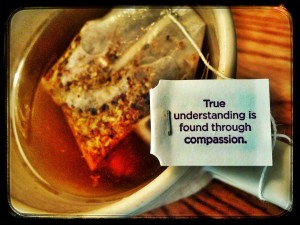Christmas is quickly coming upon us — at least those of us who celebrate the holiday. True believers, and by that I do not necessarily mean believers in Truth, will have us know that this is the time when we celebrate the birth of their favorite martyr, Jesus Christ. They will tell you that the focus of this holiday is meant to be upon the deeds and messages of the Christ, and they will occasionally complain about the commercialized nature of the holiday. On that last point, I agree with them wholeheartedly. Too many people seem to believe that Christmas is about celebrating excess consumerism, branded marketing and petty indulgences. Yet the real meaning of the holiday isn’t exactly either of those extremes.
Continue reading The True Meaning of Christmas, or Don’t Let Religion Ruin the Holidays
Tag Archives: Sense
When Being Unfortunate is Good Fortune
People talk about luck all the time. Good luck that this happened, bad luck that that happened. It is spoken of as if “luck” is an actual thing, with a consciousness or purpose. Yet, rationally, we should all understand that luck does not exist. There is “chance.” There are “odds.” But there is no such thing as luck outside of an emotional response to fortune (or lack of it). That is to say, one might feel fortunate if, for instance, one were to be diagnosed with a chronic disease early enough to do something to stem the tide, or live in a country where the survival rates are generally above 50 percent and increasing rather than decreasing.
Of course, there are those who would be in a wealthy country with cutting edge healthcare and an early diagnosis who would still only see their personal misfortune with such a diagnosis. But this isn’t about those pathetically myopic individuals, this is about the reason we should be glad we don’t live in India. And if you happen to be reading this from within the borders of India, my apologies, but hopefully you are a politically motivated activist with the means to make your voice heard.
Continue reading When Being Unfortunate is Good Fortune
Old Age Is Bad for You
Old age is bad for you, but it isn’t necessarily going to kill you. At least not right away.
This concept may seem obvious, but I think it bears mentioning. Life is fragile. We complain all the time, it seems, about ailments and fears. I mean this culturally, socially, as something that simply is part of the ongoing discussion. And the older we get, whether that means moving into our 30s or 40s or through middle age into the senior years, it seems to occur with greater frequency. In my 20s I had back problems and knee problems and I used to bitch about them, more so in my 30s, along with headaches and other nonsense. So I get migraines. So I pulled that muscle. It’s all a bitch getting older.
Continue reading Old Age Is Bad for You
Rejecting Research Is Never a Good Option
As a person living with cancer, I get suggestions all the time to look at non-medical treatments. By this, I mean mainly nutritional or holistic approaches that are meant to directly replace the use of “Western” medicine. Each suggestion comes with an anecdotal reference to someone who was “cured” by these methods, which range from the clearly bizarre to sensible health choices. Digging deeper, of course, reveals that every verifiable success story includes the use of early surgery or extensive chemo and radiation therapies.
And none of them, so far, have applied directly to my particular brand of cancer.
It doesn’t bother me so much to
Wartime Bad, Peace Good
We all have our daily battles. For me, these often have included little things, like holding my shit together while my daughter danced in front of the mirror instead of getting dressed for school or brushing her teeth. Lately, my battles have expanded to getting a deep breath after climbing the stairs, or getting up from a chair. Or just standing in a corner, leaning against a wall. Thankfully, that sort of battle is still relatively rare for me and only lasts a short time, but they remind me of how unimportant (or maybe very important) other battles have been–not in the fighting, of course, but in the experiences around them.
Continue reading Wartime Bad, Peace Good
Negativity is Positively Not in Your Best Interest
I had a few other titles for this post sliding around in my brain. After getting up and down to move the cat out of my daughter’s bedroom a few times, this is the only one that had stuck, so I’m going to go with it in spite of the cheesy wordplay. Partly, that is because it is also an accurate summation of my perspective.
Today is November 7th, 2014. It’s a Friday. And it is a good day.
Yesterday, after three-odd months of waiting and questions and test after test, I finally received a diagnosis from my doctor regarding why I haven’t been feeling precisely top-drawer recently. It turns out that, in general terms, I have Stage 4 Lung Cancer. More specifically, I have Adenocarcinoma, which is a non-small cell form of lung cancer, and it has spread from the 3 odd centimeter mass in my left lung to a few lymph nodes and eventually down to my hip bone. And I am so thankful to have this diagnosis. Not because I am pleased to “have cancer,” which would be kind of perverse, but because now I know what I am dealing with and I can get on with it.
Continue reading Negativity is Positively Not in Your Best Interest
Cheap Wisdom: Not Worth Anything.

realize that compassion MEANS the attempt to understand, not only does it become clear that the quote lacks any substance whatsoever, but that it is also backwards. And this is indicative of cheap wisdom, the intent of which is never to actually encourage thought, but rather to encourage passive acceptance. It becomes insidious when applied toward broader social aims, and is a tactic routinely used in politics as well as commercial advertising. Continue reading Cheap Wisdom: Not Worth Anything.
The neglect & trivialization of violence against women is horribly wrong
Native American Women are disproportionately victimized without justice. This is horribly wrong. Domestic issues of victimization through forced prostitution are swept under the rug, with the prostituted frequently being punished when they are often the true victims. Often discussed dispassionately as a “global problem” with the thought that this sort of thing happens only in underdeveloped or backward nations, it is truly happening in every country and in virtually everyone’s backyard. Hyperbolic? Not particularly; it just depends how you define “backyard.” For the sake of this position, I will broaden it to mean “local community,” and challenge you, dear Reader, to find a community in the United States that does not have at least one instance of violence against women. Continue reading The neglect & trivialization of violence against women is horribly wrong
Email is ruinous

The United States Postal Service is a national treasure. A beacon of efficiency, the USPS has historically been the best and least expensive way to send correspondence or small packages. Now, however, it is being threatened with huge cuts. Some in the government have questioned its relevance in the 21st Century. But our postal system may actually be more relevant now than ever before.
The Art of Communication has faltered in the age of email and Twitter. People have gotten lazier and lazier in the name of character efficiency to the point where a limited number of characters has drained the character right out of typical tweets. Continue reading Email is ruinous
Panic: Very Unhealthy
Here is an interesting example that I came across online: Survival Joe’s Newsletter. It even comes with one of those handy newfangled barcode links for those of you who have a free smartphone in your hand as you read this.